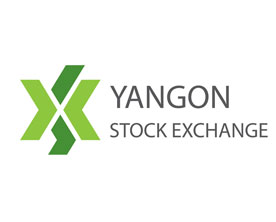On 25 January 2017, there was an aggregate of 16,988 shares traded on the Yangon Stock Exchange (YSX) for which the trading value totaled at 159.58 million Kyats. Among the four listed companies, First Myanmar Investment (FMI) saw a trading volume of 1039 with shares closing at 14,000 Kyats. Myanmar Thilawa SEZ Holding (MTSH) sold out 13,161 shares that closed at 4,100 Kyats. Transaction took place for 100 shares on that day for Myanmar Citizens Bank (MCB) with shares finishing at 9,000 Kyats. Trading volume of First Private Bank (FPB) reached 2688 with a closing price of 33,500 Kyats. MYANPIX (Myanmar Stock Price Index), the YSX stock price indicator of market capitalisation-weighted type, showed a small negative change for the day on which market capitalisation at the Exchange slipped to 664,753 million Kyats from 670,921 million Kyats the day before. The trading volume of the previous day (24 January 2017) was 20,536 and the least active for the day was MCB that merely had 3 shares traded. Look back to 2016, share trading on the YSX continually declined in most of the months apart from such unusual months during which a new firm entered the Exchange or a stock split took place. During the nine months of trading on the YSX following its launch in December 2015, the barometer of share exchange progress mostly showed downturn except in May when MTSH became listed and in October during which MTSH performed a share split.
The YSX index closed 2016 with a red of 44 percent c0mpared to its status by the time the stock market began.
In the final week of 2016, FMI ended up with a lowest share price for the year after encountering a share price drop for three straight weeks. The market value of the company contracted more than a half (56 percent) compared to the moment it started trading on the Exchange.
The share price of MTSH in the ending week of December 2016 was the lowest within nine weeks, declining 17 percent from the opening price tagged on November 4 after a stock split was carried out in October. The market value of the firm experienced a shrinkage of 12 percent when weighed up to the time it entered the YSX.
During the last week of 2016, the share price of MCB was the lowest in six weeks and there was a freeze day same as the previous weeks. Although the trading volume expanded one times than the week before, it was approximately 60 times smaller than the trading volume of two other listed companies.
FPB entered the YSX only on 20 January 2017 as the fourth listed company. It became the first YSX-listed firm to see its share price declined instantly after starting trading. FPB offered the shares at a base price of 39,000 Kyats but the opening price stood only at 34,000 Kyats. All of its predecessor listed firms enjoyed a big surge in share price on the first day of trading, albeit the market turned cool in the subsequent months. The sluggish activity of the YSX can be mainly attributed to the lack of awareness and interest in stock market among the general public. Few people know about the stock exchange and only a handful of citizens take part in trading. Planners and actors failed to carry out stock exchange-related education enough. At the present, foreigners are barred from trading on the Exchange. However, some officials assigned have a positive view on the YSX. “There are four listed companies at the Yangon Stock Exchange right now. It has been nine months the Exchange began trading. The total share trading value is more than 71 billion Kyats. This is a substantial success for such a short period,” said Thet Tun Oo, executive senior manager at the YSX as well as a well-known writer on banking and finance, corporate governance and investment market. He is hopeful about the progressive future of the YSX as the Exchange demonstrates stronger performance than some other forerunner bourses in neighbouring countries if compared for similar time span.
Maung Maung Win, Deputy Minister for planning and finance and chairman of the Myanmar Securities Exchange Supervisory Commission, also pointed out that market capitalisation and trading value figures at the YSX are higher than in Vietnam and Laos in just the first year of trading. The authorities now set to provide stock exchange training extensively.
FMI, the first listed company on the YSX, has registered a total of 23,480,013 shares on the bourse. It has listed the stocks already offered in the OTC (Over-the-Counter) market and does not issue new shares. Founded in 1992 as one of the earliest business conglomerates in Myanmar, the investment holding company became listed on 25 March 2016. It mainly ventures in financial services, real estate and healthcare sectors.
MTSH, that has registered 38,929,150 shares, entered the bourse on 20 May 2016 to become the second listed firm. Formed in May 2013, MTSH invests in businesses engaged in real estate development in Myanmar. It was established by a Myanmar consortium comprising nine principal shareholders with a primary (but not exclusive) purpose of participating in the Thilawa Special Economic Zone (Thilawa SEZ) project.
MCB entered the Exchange on 26 August 2016, registering 10,400,986 shares. The bank was founded in 1991 and started business in mid-1992. It is a joint venture between the Ministry of Commerce and the conglomerate Capital Diamond Group.
FPB was the fourth to list on the YSX and has registered 2,472,053 shares. Established in 1991, FPB holds the oldest banking licence in Myanmar. It entered the bourse on 20 January 2017.
Two out of six companies already chosen for trading on the stock market are yet to come to the Exchange – namely Great Hor Kham and Myanmar Agribusiness Public Corporation (MAPCO). Great Hor Kham is a general contract construction company, engaging in activities that include design and construction of roads, bridges, elevated ways, expressways, buildings and industrial factories, and mechanical and electrical system works such as installation of equipment and machinery for factories. MAPCO is a public corporation with a focus in agricultural investment and agro-based industries. The history of the Yangon Stock Exchange traces back to 1996 when Myanmar Economic Bank and Daiwa Institute of Research Ltd. established the Myanmar Securities Exchange Centre (MSEC) with the ultimate goal of launching a stock exchange. Securities and Exchange law was enacted in July 2o13. In August 2014, the Securities and Exchange Commission of Myanmar (SECM) was created under the Ministry of Finance. The commission was led by former Deputy Minister for Finance Maung Maung Thein, who is one of the most important initiators in the realisation of the YSX. In December 2014, the YSX was incorporated and registered by the Directorate of Investment and Company Administration (DICA), and the bourse obtained permission of stock exchange business issued by SECM in April 2015. Then the Exchange was officially launched on 9 December 2015 and started trading on 25 March 2016.
Until 2015, Myanmar had been one of the only three countries in Asia that do not have their own stock exchange – two others being Brunei and North Korea. Among CLMV (Cambodian, Laos, Myanmar and Vietnam) countries, Cambodia founded its securities exchange in July 2011; Laos launched its securities exchange in January 2011; Vietnam established its first stock exchange in Ho Chi Min city in July 2000 and another stock exchange in Hanoi in March 2005.










